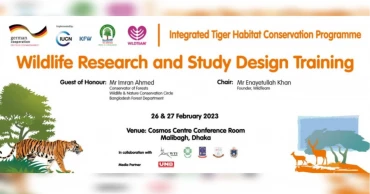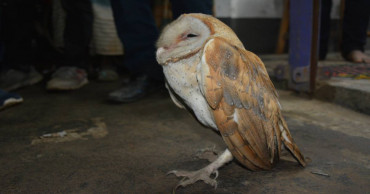conservation
SeaKeepers Society: Making waves in ocean conservation
The International SeaKeepers Society is a non-profit organization that focuses on ocean conservation and research. They work to promote scientific research, raise awareness about marine issues, and support innovative solutions to address challenges facing the world’s oceans. One of their key initiatives involves engaging the yachting community in oceanographic research, using private vessels as platforms for scientific data collection.
The Bangladesh chapter of the International SeaKeepers Society was recently launched, with Enayetullah Khan, editor-in-chief of United News of Bangladesh (UNB) and managing director of Cosmos Group, named as its president.
Also read: International Seakeepers Society arrives in Bangladesh to work on ocean health
Jay Wade, chairman of International SeaKeepers Society, and Julian Chang, president of SeaKeepers Asia, were in Dhaka to formally make the announcement of the launch of the Bangladesh chapter with Enayetullah Khan as its president on November 8, 2023.
During a one-on-one conversation with UNB, Wade explained how the SeaKeepers Society is essentially harnessing the power of yachts for a good cause, facilitating scientist-led expeditions around the world to gather more knowledge, and making waves in ocean conservation.
“I came into SeaKeepers right around 2003. I had a submersible, a two-person submersible, and we dove all over the world. I was in Monaco, for an event, and that’s where I met the SeaKeepers team. I’m a programmer by trade, and I had a software company. We did a lot of work with big data at the time,” Wade recalled how he joined the organization.
“The way SeaKeepers operate is: An owner would put a device we call the ‘SeaKeeper 1000’ on the yacht, and as they travel around the oceans, it would measure roughly 10 different items of the ocean and a handful of items from the air, package those up, collect that data, and then send it back via satellite to a database in the United States. Then from there, we shared it with scientists. So when I heard that and being somebody who loves the ocean, I thought, ‘wow, that’s a really good idea, and I want to be a part of it.’ That’s when I signed up to become a SeaKeeper,” he said.
Also read: International Seakeepers Society opens Bangladesh chapter with Enayetullah Khan as president
“Over the years, we have changed what we do a little bit. We still enable protection and restoration of the world’s oceans, and we still collect data. But we’ve added several other things to that – education, community involvement, citizen science, and Discovery Yachts. As time has gone on, we’ve been able to grow our fleet and expand our operation,” he added.
Talking about in how many countries they operate, the SeaKeepers Society chairman said, “Our main office is in Miami, Florida. We also have an office on the West Coast of the United States, in Newport Beach, California. Those two offices typically handle all of North and South America. Then we have an office in London, which right now handles Europe. There’s an office in Singapore for Asia, and one in New Zealand, which operates for South Pacific. We will probably add 6 to 10 more offices around the world to facilitate the science and restoration.”
On the significance of the Bay of Bengal and Sundarbans, he said, “Preserving those areas is good for the earth, which ultimately is good for the people. However, you can’t preserve anything unless you take the local communities into account. So, one of the things we’re very cognizant of is that it’s really important to work with local communities for successful preservation. That’s the primary reason we’re here this week.”
“Before this year, we had about 200 yachts involved in the SeaKeepers Society. This year, we’ve added quite a bit more. We’ve added roughly 10,000 boats that are part of owners’ groups for different brands that we work with. It’s going to take several years to get them all on board and get them trained. I’d say in the next three years, we should have 10,000,” Wade said about the size of the fleet.
2 years ago
Transboundary Collaboration with India needed for Bengal Tiger conservation: Environment Minister
Environment, Forest and Climate Change Minister Md. Shahab Uddin stressed the need for strengthening the transboundary collaboration with India for the conservation of tigers and leopards in Bangladesh as the two countries have shared tiger and leopard habitat.
“Considering the conservation importance of seven big cat species on earth and two critically endangered big cat species in Bangladesh, we in principal support the creation of the International Big Cats Alliance (IBCA) with a membership of the range of countries harboring these species,” he said.
The minister said this at an event organized on the occasion of the International Conference on Tiger Conservation as part of 50 years of Project Tiger held on Sunday at Mysuru University in Mysuru, Karnataka, India after the inauguration of the event by Prime Minister of India Narendra Modi.
Sahab Uddin said Bangladesh government is working with the determination to double the number of wild tigers by achieving zero poaching target with the active participation of local community.
It’s a matter of hope that wild tiger numbers are starting to tick upward he said adding that government has taken several remarkable initiatives for conserving the national animal and other wild species.
Shahab Uddin said Bangladesh government is implementing National Tiger Recovery Program (2022 to 2034) and second-generation Bangladesh Tiger Action Plan (2018-2027) which include tiger survey; genetic study; SMART patrolling and monitoring by drone inside the Sundarbans; capacity building programs for frontline staffs of the Forest Department as well as local community to ensure protection & conservation of the Sundarbans and Bengal tiger.
The Minister said, a protocol was signed between Bangladesh and India for strengthening collaboration for the Conservation of Royal Bengal Tiger in the Sundarbans in 2011.
The Minister said to mitigate tiger human conflicts, our government has engaged the local community in tiger conservation activities by forming Village Tiger Response Team, Co-management Committee and Community Petrol Group.
Wildlife Victim Compensation Rules, 2021 has the provision to give compensation up toTk 3 lakh for person killed by tiger, he said.
Wildlife Crime Control Unit has been established under Forest Department to combat illegal wildlife trade and to strengthen the capacity of wildlife education, research and training, Sheikh Kamal Wildlife Center has been established which is working as a center of excellence, said the minister.
Prime Minister of India Narendra Modi launched the International Big Cats Alliance (IBCA) which will focus on protection and conservation of seven major big cats of the world such as tiger, lion, leopard, snow leopard, puma, jaguar, and cheetah in collaboration with the countries concerned.
The Environment and Forest Ministers of the countries harboring these species were present on the occasion.
2 years ago
Integrated Tiger Habitat Conservation: WildTeam hosting workshop at Cosmos Centre on Feb 26-27
Dhaka, Feb 25 (UNB) – WildTeam, a leading environmental conservation organization, is set to host a two-day workshop titled ‘Integrated Tiger Habitat Conservation Programme’ on February 26 and 27 at the Padma Conference Room, Cosmos Center in Malibagh, Dhaka.
The workshop aims to provide participants with the knowledge and skills necessary to plan, design and conduct successful wildlife research projects.
The WildTeam workshop is an exclusive collaboration with the Bangladesh Forest Department, Wildlife Trust of India, Jahangirnagar University, Dhaka University, Jagannath University, and Noakhali University of Science and Technology. Participants with an interest in wildlife research, including research students, researchers, and professionals will have the opportunity to learn from experienced researchers and practitioners in the field of wildlife biology and conservation.
This will be the first time that researchers from India and Bangladesh will gather and share their thoughts, knowledge, and practice initiatives on what should be done for the betterment of wildlife conservation.
Also Read: 300 sheltered at WildTeam’s Conservation Biology Centre during Sitrang
Imran Ahmed, Conservator of Forests, Wildlife and Nature Conservation Circle, Bangladesh Forest Department, will join the workshop as the guest of honour, while the workshop will be chaired by Enayetullah Khan, Founder of WildTeam and Chairman of Cosmos Foundation.
The workshop will cover a range of topics, including the principles of research design, field data collection techniques, data analysis, and report writing. In addition, participants will learn about the latest tools and technologies used in wildlife research, including GPS tracking, remote sensing, and camera traps. A total of 50 participants are set to join the two-day workshop, from 9:30 am to 5:00 pm on day one (February 26) and 10:00 am to 4:45 pm on day two (February 27).
“We are thrilled to host this workshop and provide participants with the skills and knowledge they need to conduct successful wildlife research,” said Professor Dr Md Anwarul Islam, CEO and spokesperson for WildTeam. “We believe that this workshop will be an excellent opportunity for participants to learn from experienced researchers and practitioners and to network with others in the field.”
The event includes all workshop materials, refreshments, and lunch on both days. Participants will also receive certificates at the closing ceremony of this exclusive workshop.
About WildTeam:
WildTeam is a leading environmental organization committed to protecting wildlife and their habitats. The organization's mission is to work with communities, governments, and other stakeholders to promote sustainable wildlife conservation and management practices.
2 years ago
Bangladesh balances energy needs with climate, conservation
Fish, rice, mangrove trees and the lush delta wetlands where the massive Ganges, Brahmaputra, and Meghna rivers drain into the Bay of Bengal.
It’s not luxury. But for the farmers and fishermen who live by the world’s largest mangrove forest, it’s more than enough. Now, the environment is at risk.
A power plant will start burning coal near the Sundarbans this year as part of Bangladesh’s plan to meet its energy needs and improve living standards, officials say. Home to 168 million people, Bangladesh is among the most densely populated countries in the world. Once the power plant begins functioning at its full capacity, it will generate 1,320 megawatts of power, as much as Bangladesh’s largest coal power plant generates now.
The developing world needs its people to live better. But fossil fuel-powered economic growth can create environmental problems and make lives worse.
Read more: Power flow set up from Payra plant to Rampal sub-station
3 years ago
WildTeam’s 18th AGM held
The 18thAnnual General Meeting (AGM) of WildTeam, a conservation organization, was held at its head office at Cosmos Centre, Malibagh, Dhaka, on Thursday.
The AGM elected a five-member executive committee comprising Mr Enam Ul Haque as the Chairman of the board, Mr Md. Shamsur Rahman as the Vice-chairman, Professor Dr Md. Anwarul Islam as the General Secretary, Professor Dr Gawsia Wahidunnessa Chowdhury as the Treasurer, and Mr Enayetullah Khan as a member.
Among others, Professor M Harunur Rashid, Professor Dr Nitish Chandra Debnath, Professor Dr Mizan R Khan, Professor Dr Mohammad Abdul Aziz, Professor Dr Ismot Ara and Ms Alifa Bintha Haque who are also the members, congratulated the executive committee.
Also read: Ban on entering Sundarbans: 2 lakh families pushed into financial hardship
The AGM unanimously nominated Ms Nahar Khan, Director, UNB, and Vice President, Cosmos Group, as a member of the WildTeam. She was welcomed to the board by all.
WildTeam is carrying out its activities to improve the conservation status of key animal species and habitats in Bangladesh and developing partnerships, tools, and platforms to build the capacity of organizations and individuals to carry out effective conservation in the country. WildTeam was able to engage communities in the Sundarbans with support from Bangladesh Forest Department, USAID, US Fish and Wildlife Service, Zoological Society of London, IUCN-KfW, and others to conserve tigers there.
WildTeam team is now working in almost all the 76 villages of the Sundarbans with its volunteers: 340 Village Tiger Response Team (VTRT) members, 55 BaghBandhus (friends of tigers), and 50 TigerScouts.
Also read: Sundarbans Day: Biodiversity under threat as salinity increases
At present WildTeam is implementing IUCN-KfW’s Integrated Tiger Habitat Conservation Programme Phase II, in collaboration with the Wildlife Trust of India and Jahangirnagar University, in the Sundarbans.
3 years ago
Villager felling palm tree rescues barn owl
A rare barn owl has been rescued from a village in Kaharol upazila of Dinajpur district.
6 years ago




.jpg)





